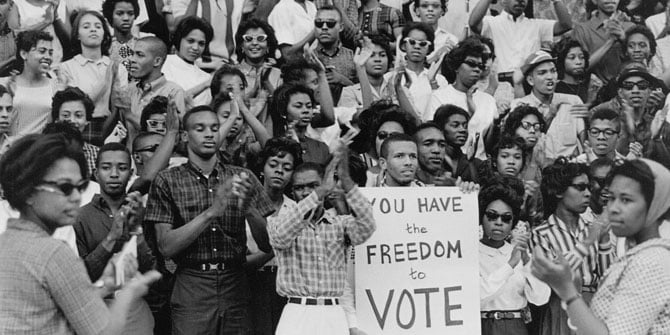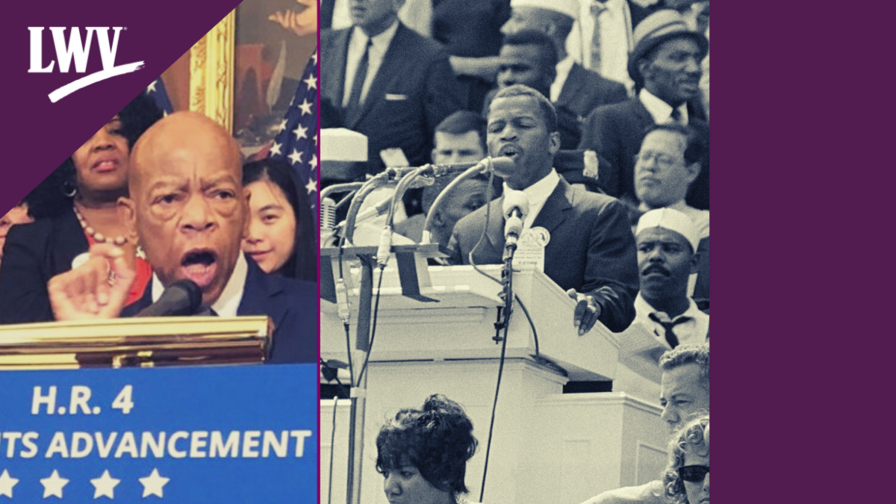Voting Rights History is Black History
Updated 4/30/24
Celebrating voting rights history and Black history go hand in hand. As we commemorate the great leaders and moments — both the known and the unsung — we must remember that the struggle to protect voting rights continues. We must continue to fight to ensure that we are not adding another chapter of discrimination and Jim Crow-era politics.
Black History and the Voting Rights Movement(s)
The right to vote for Americans has been hard-fought (and won) by different communities since the founding of our nation. In 1776, white male property owners were given the right to vote. Following the Civil War, the 15th Amendment was adopted in 1870 to break down the racial divide in voting, but states continued to set restrictions and deny the right to vote to Black Americans. Finally, in 1920, white women were given the right to vote. But it wasn’t until the 1960s and the passage of the Voting Rights Act (VRA) that Black men and women had a clear path to the voting booth.
1965 was filled with peaceful protests, violent reactions, and eventual action by Congress and the President. On a Sunday in March of 1965, peaceful protestors were met on the Edmund Pettis Bridge in Selma with violent attacks by Alabama State Police. This created a tipping point around the need for federal protections in the absence of action by state and local officials to protect their citizens. “Bloody Sunday,” as it has become known, forced Congress to enact federal voting rights protections, creating the Voting Rights Act of 1965, which banned racial discrimination in the voting process.
No piece of legislation has had such a large impact on the voting lives of Black Americans. Before the VRA's passage, a report entitled Federal Protection of Negro Voting Rights found that southern states like Alabama and Mississippi had registration levels in the Black population in the low teens. The report also found that the Black voters who were registered were being disproportionately targeted by literacy tests, ID requirements, and monetary “poll taxes” that white voters were not subject to.
It wasn’t until the adoption of the Voting Rights Act that it was possible to stop discriminatory voting laws from going into effect immediately and causing damage to the ability of Black voters to participate. Later, as the bill was reauthorized by Congress, the legislation also helped to end discriminatory voting tactics used against other communities of color.

Racism and Voter Discrimination Today
Discrimination should not exist regarding the freedom to vote, yet our fight is far from over. Year after year, anti-voter legislation passes in legislatures around the country.
The 2020 election had a historic turnout, helped by the expanded ways people were able to vote during the pandemic. But when parties in power decide they don't like the outcome of an election, they take aim at voters by enacting legislation intended to legally discriminate against those who voted against the party in power's interest. This typically includes Black and brown Americans, AAHNPI Americans, Indigenous Americans, people with disabilities, and young Americans; these are the communities that are most likely to be affected by anti-voter laws.
Since the Supreme Court gutted the VRA's protections in Shelby County v. Holder, state legislatures across the country have done everything in their power to create barriers to voting. With voter discrimination still occurring, the need for the Voting Rights Act still exists.
The Supreme Court has repeatedly called out Congress’ responsibility to rewrite the VRA, stating that the original intent of the law — protecting voters from blatant discrimination — is still needed. Lack of action from Congress has allowed bad actors in states across the country to methodically slice away at the representation of communities of color.
Currently, Congress had before it a bipartisan piece of legislation, the John Lewis Voting Rights Advancement Act. It is crucial that we pass this legislation, which will fully restore and modernize the VRA and ensure that discriminatory voting policies are stopped in their tracks. Past attempts to pass this bill have failed to move it forward past the 60-vote Senate filibuster. Let your representatives know that failure is no longer an option.
Our fight is not over. We will not give up. Just like John Lewis, the League, our partners, and the civil rights community, we will not give up on the promise of voting rights. We will not give up until every American has the freedom to vote. We take inspiration from the Black leaders who for so long have stood up and demanded the rights and responsibilities that all Americans are guaranteed in the Constitution. We join them in a fight that has gone on for too long, but that we will not abandon. We must restore the Voting Rights Act. We must end discrimination in voting in every state, county, parish, or municipality across the country. We must protect the freedom to vote.
The Latest from the League
League of Women Voters of the US Board President Dr. Deborah Ann Turner issued the following statement in response to the Senate’s first floor vote on the John Lewis Voting Rights Advancement Act.
From Ida B. Wells to Stacey Abrams, Black women have played a pivotal role in the advancement of voting rights. Although there have been obstacles along the way, Black women as a collective power are a force to be reckoned with. While Black women are not a monolith in any shape or form, they have and continue to use their voices to make progress on many issues, especially voting rights.
The Voting Rights Act of 1965 was one of the most important pieces of legislation of the 20th century. But in 2013, the Supreme Court gutted important sections of it in Shelby County v. Holder.
Sign Up For Email
Keep up with the League. Receive emails to your inbox!
Donate to support our work
to empower voters and defend democracy.






